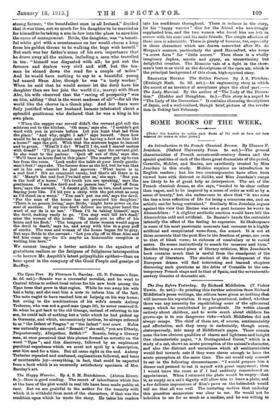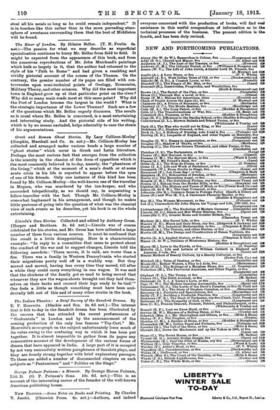SOME BOOKS OF THE WEEK.
[Under this heading we notice such Books of the week as hare not bee* coursed for review in other forms.] In Introduction to the French Classical Drama. By Eleanor F. Tourdain. (Oxford University Press. 6s. net.)—The general characteristics of French seventeenth-century drama and the special qualities of each of the three great dramatists of the period, Corneille, Moller°, and Racine, are excellently treated by Misfit Jonrdain in this study. Moliere requires no introduction to English readers ; but his two contemporaries have often been viewed here with distrust or dislike, and Miss Jourdain's essays are likely to be of great help as interpreters. The art of the French classical drama, as she says, "tended to be clear rather than vague, and to be inspired by a sense of order as well as by a sense of beauty," but she endeavours to show that "it was none the less a true reflection of life for being a conscious one, and an artistic one for being restrained." Similarly Miss Jourdain argues against the view that Racine was not a poet because he wrote in Alexandrines : "A slighter aesthetic emotion would have left the Alexandrine cold and artificial. In Racine's hands the restraints intensify the effect of the feeling he expresses. So Shakespeare in some of his most passionate moments had recourse to a highly artificial and complicated verse-form, the sonnet. It is not at those moments that the poet flies to the freedom of prose, nor even to that of blank verse; to richness of vocabulary or to varied metre. He seems instinctively to search for measure and form." Besides being a sound piece of literary criticism, Miss Jourdain's book contains much that is useful from the standpoint of the history of literature. The student of the development of the European drama will find interesting and learned chapters discussing such questions as the debts of Corneille to the contemporary French stage and to that of Spain, and the seventeenthcentury theories of dramatic art.
The Day Before Yesterday. By Richard Middleton. (T. Fisher Unwin. Ss. net.)—In printing this further selection from Richard Midclleton's prose writings, the editors have given us nothing that will increase his reputation. It may be questioned, indeed, whether there was any necessity for republishing some of the ephemeral essays which he contributed to periodicals. He writes almost entirely about children, and to write much about children for grown-ape is to run dangerous risks—which Middleton did not always escape. The chief of them are, of course, sentimentality and affectation, and they creep in undeniably, though never. obstreperously, into many of Middleton's pages. There remain none the less obvious qualities of charm and lightness and insight One characteristic paper, "A Distinguished Guest," which is s study of a cat, shows an acute perception of the animal's character, and also the distrust and uneasiness which all sentimentaliErta would feel towards cats if they were clever enough to have the acute perception at the same time. The cat would only consent to eat in the following circumstances : "I would prepare him a dinner and pretend to eat it myself with great enjoyment ; then I would leave the room as if I had suddenly remembered an appointment. When I returned the plate would be empty—that is, as empty asa cat's dignity will allow him to leave a plate, and a few delicate impressions Of Kim's paws on the tablecloth would tell me that all was well. The irritating motive that underlay this graceless mannerism was clear to me. Ho would not be beholden to me for so much as a sardine, and he was willing to
steal all his meals so long as he could remain independent." It is in touches like this rather than in the more pervading atmosphere of sweetness surrounding them that the best of Middleton will be found.
The River of London. By Hilaire Belloc. (T. N. Foulis. 5s. net.)—The passion for what we may describe as superficial specialization continues to hurry Mr. Belloc from field to field. It might be expected from the appearance of this book, and from the numerous reproductions of Mr. John Muirhead's paintings which bulk so largely in it, that the author had returned to the style of his "Path to Rome" and had given a rambling and vividly pictorial account of the course of the Thames. On the contrary, the greater number of its pages are filled with controversies upon semi-technical points of Geology, Economics, Military Theory, and other sciences. Why did the most important town in England grow up at that particular point on the river ? Why did so many main roads meet at this same point? Why did the Port of London become the largest in the world ? What is the strategic importance of the Lower Thames ? Such are a few of the questions which Mr. Belloc eagerly discusses. The result, as is usual where Mr. Belloc is concerned, is a most entertaining and interesting study. And the pictorial side of his writing, which is by no means excluded, helps admirably to ease the strain of his argumentations.
Greek and Roman Ghost Stories. By Lacy Collison-Morley* (Simpkin, Marshall and Co. 3s. net.)—Mr. Collison-Morley has collected and arranged under various heads a large number of "ghost stories" which occur in Greek and Latin literature. Perhaps the most curious fact that emerges from the collection is the scarcity in the classics of the form of apparition which is the most commonly believed in to-day, namely, the "phantasm of the living," which at the moment of a man's death or at some acute crisis in his life is reported to appear before the eyes of one of his friends. Only one instance of this kind has been found by Mr. Collison-Morley—the well-known one of the traveller in Megara, who was murdered by the inn-keeper, and who succeeded telepathically, as we should say, in acquainting a fellow-traveller with the fact. Though Mr. Coulson-Morley is somewhat haphazard in his arrangement, and though he makes little pretence of going into the question of what was the classical view of such events as he describes, yet his book is on the whole entertaining.
Lincoln's Own Stories. Collected and edited by Anthony Gross. (Harper and Brothers. 3s. 6d. net.)—Lincoln was of course celebrated for his stories, and Mr. Gross has here collected a large number of them from various sources. It must be confessed that the result is a little disappointing. Here is a characteristic example : "In reply to a committee that came to protest about the conduct of the war and to suggest changes, Lincoln told the following anecdote: `Three moves, it is said, are worse than a fire. There was a family in Western Pennsylvania who started their migrations pretty well off in a worldly way. But they moved and moved, having less every time they moved, till after a while they could carry everything in one wagon. It was said that the chickens of the family got so used to being moved that whenever they saw the wagon-sheets brought out they laid themselves on their backs and crossed their legs ready to be tied." One feels a little as though something must have been accidentally left out of this and of many other stories in the book.
The Indian Theatre : a Brief Survey of the Sanskrit Drama. By E. P. Horrwitz. (Blackie and Son. 2s. 6d. net.)—The interest that is felt to-day in the Sanskrit drama has been illustrated by the success that has attended the recent performances of " Shakuntala" in London and by the announcement of the coming production of the only less famous "Toy-Cart." Mr. Horrwitz's monograph on the subject unfortunately loses much of its value owing to the confusing way in which it has been put together. It is almost impossible to gather from its pages any consecutive account of the development of the various forms of drama that have appeared in India. A largo part of it is occupied by not very successfully written paraphrases of Sanskrit plays, and they are loosely strung together with brief explanatory passages. To these are added a number of disconnected chapters on such subjects as "Pantomimes" and "Politics on the Stage."
George Palmer Putnam: a Memoir. By George Haven Putnam,
Litt. D. (G. P. Plitnam's Sons. 10s. 6d. net.)—This is an account of the interesting career of the founder of the well-known American publishing house.







































 Previous page
Previous page